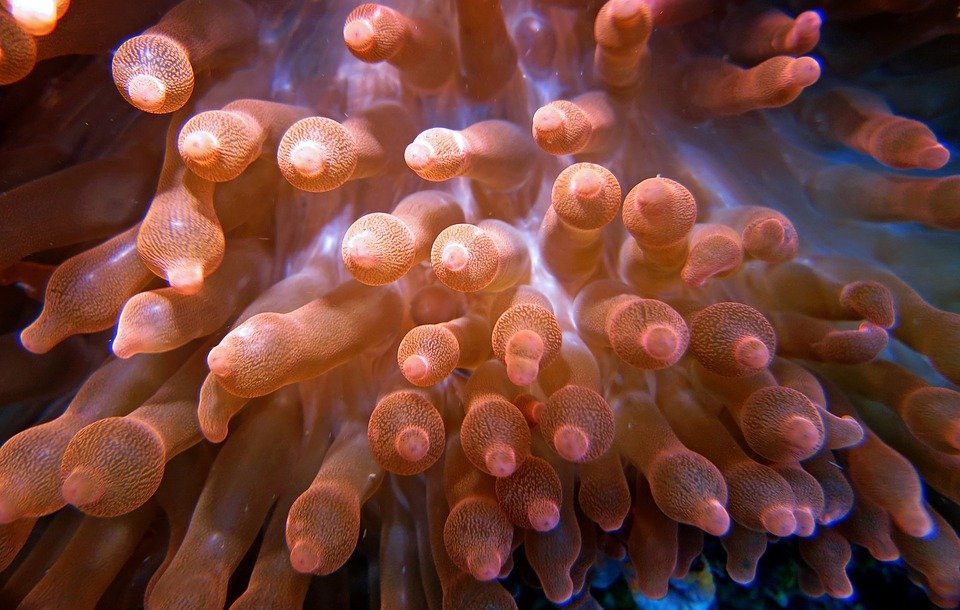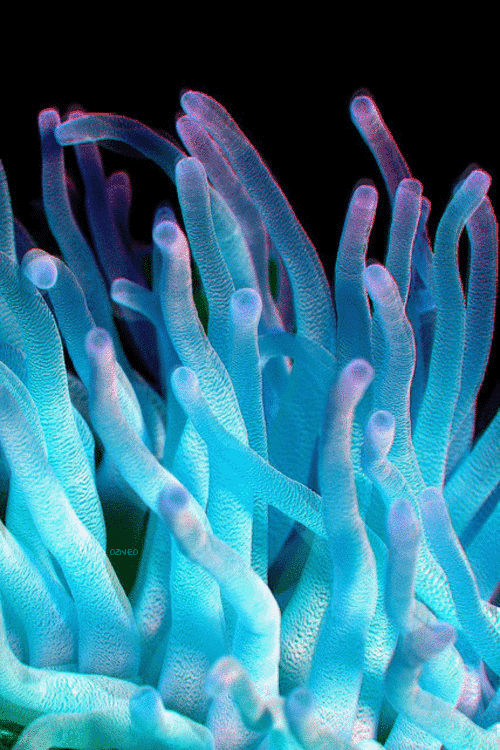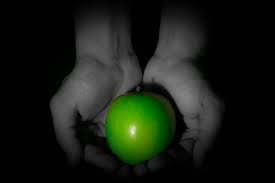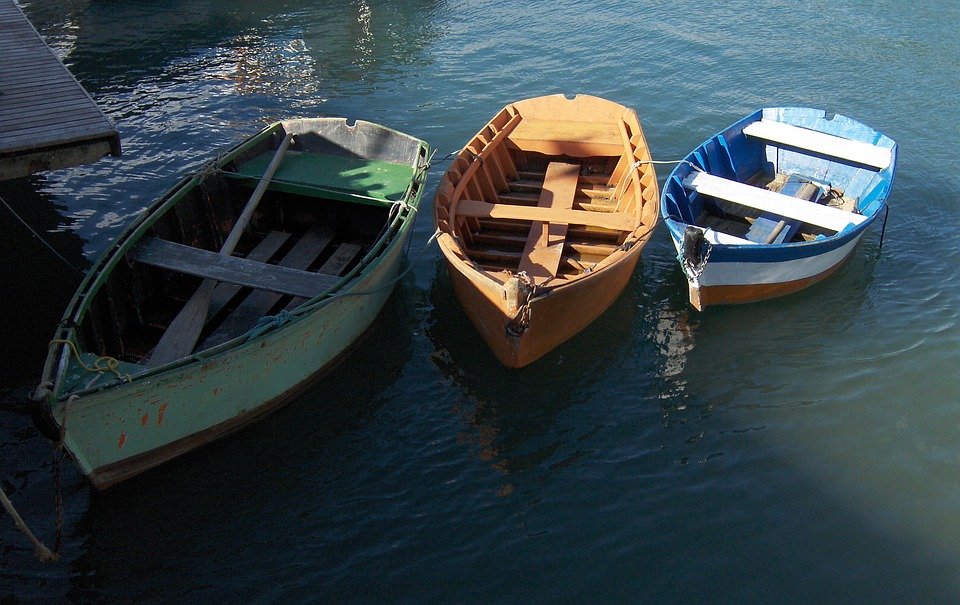
Anemone is starving, and I am running out of stories.
I have told her all the stories of my life. I have read all the books I could find and re-spun them for her.
When we were young, the aquarium used to fill up with rowboats each day. Lovers came to tell their stories, and families with children. Anemone feasted, absorbing the stories through undulating tentacles, and to each teller, she offered a gift. A red balloon, a piece of colored glass, a fountain pen. And they would row their boats back to shore, clutching their treasures, beaming delight.
No one comes to the aquarium anymore, and I fear there is no one left to come. Now, the boats lie overturned and idle on the shore, splintering in the sun. Collecting spiders. We are alone; Anemone, the spiders, and I.
For the first year, I tried to stay busy, tried to do my job. Someday the people would come back, and the aquarium must be ready for them. So each day, I swept the artificial beach, patched the boats, cleaned the aquarium filters. After awhile, I stopped doing those things. I clean the filter when it gets clogged, and I tell Anemone stories. But mostly I sit in my boat and think until thinking turns to sleep. I am too hungry to do much else.
The tank is massive in circumference but shallow in depth, and Anemone carpets its sandy floor. I row out to the center, peering beneath the water at her pink under-flesh and her waving yellow tentacles. Bringing the coiled tube out of my pocket, I unwind it and drop its weighted filter into the water.
And then I speak.
I weave a tale of a love that withers in the grip of blind tradition. The words travel down the tube and into the filter to be separated—breath from story.
The breath floats up; the story swims down.
She doesn’t give balloons or fountain pens anymore. Anemone sends up a single, boiled potato, which I devour. The skylight shows dusk. I row the boat to shore and shelter beneath it for the night.
I am down to my last story. It is a tale of leaving, and a sad one. Anemone takes a long time to cogitate it.
I wait in the rocking boat, planning the way I will go when I go outside. I will travel and find more people, or, failing that, more books. Or on my way I will come up with new stories, crafted from the sights and sounds and smells out there.
Something bobs up to the surface, knocking against the side of the boat. I fish it out: a package, wrapped in a bandanna and tied tightly. I undo the knot and supplies tumble out. A green apple, a wedge of dried meat, a canteen with a screw-on lid. And a memento: a tiny rowboat with oars that move.
A tear rolls down my cheek and splashes the water’s surface. This gift must have cost her a lot.
I reach into the water, my hand held open. One slippery tentacle finds my fingers and entwines them. I squeeze gently.
“Goodbye,” I say.

Outside is a ghost town.
Dust swirls in the street, and weeds grow tall out of the sidewalk cracks. Windows lie shattered on the ground. I falter at the gate, paralyzed by the thought that beyond the ghost town might lie a ghost county, a ghost continent, a ghost world. I almost run back into the aquarium, but I stop myself.
There is no one out on the street, no one in the shops. Nothing living but the crows and the rats and, in the distance, I think I hear howling wild packs of dogs. I tread along a lane of waste that once was Main Street, go into a store. A stack of old newspapers sits on the counter beside an open cash register. The front pages are too faded to read. The inside pages are probably fine, but I don’t bother opening them. I know what story they will tell, and it is one I cannot stomach. I leave the store and I don’t go into any of the others.
By midday, my breath comes out in gasps and wheezes. I hadn’t realized how weak I am until now, and how old.
Trees spread barren branches over the fractured road, casting a stingy web of shade over the ground. I stop to rest, leaning against a solid trunk, take a nibble of meat, a sip of water. I don’t know how much farther I can go. The hunger bites me. How nice it would be, how pleasant and comfortable, to lie down just here in the soft brown grass by the side of the road and drift off to sleep.
I raise myself to my feet and press on.

Rain.
I take cover on the front porch of an old farmhouse, under a sagging roof. There is a rocking chair, and it creaks when I sit in it. I open the blue bandanna in my lap and take out the apple.
A little startled sound makes me jump in my seat. In the yard, a thin child stands, raindrops coursing dirty trails down her face. Another child, thinner still and taller, tries to pull her away by her ragged shirt sleeve, but the smaller child will not budge.
“Look!” says the small one. “That man’s got an apple!”

I stagger through the gate.
The children help me up the steps to the aquarium, one on each side of me. The smaller one clutches the tiny rowboat in her grubby hand and it presses against my palm.
“Is that the amenomy?” She leans toward the water, wide-eyed.
Her brother says, “Be careful. Don’t fall in.”
They clamber into the waiting boat and with the last of my strength I heave it onto the water. I hand the coiled speaking tube to the girl and tell the boy to move the oars. He rows as the girl trails her fingers in the water, grazing the tips of smooth, bright tentacles. When they reach the center of the tank, she drops the weighted end of the tube in, holds the other end to her mouth, and speaks.
“Once upon a time…”
Outside is a ghost town. I walk to the edge of town, find place in the soft, brown grass and I lie down to sleep.
by Leslie Starr O'Hara
Thank you for reading my story, "Feeding Anemone". If you enjoyed this story, follow me for more strange fiction!
I'd love to hear your thoughts on this story in the comments.
